12 Mistakes You Might Be Making When Frying Eggs
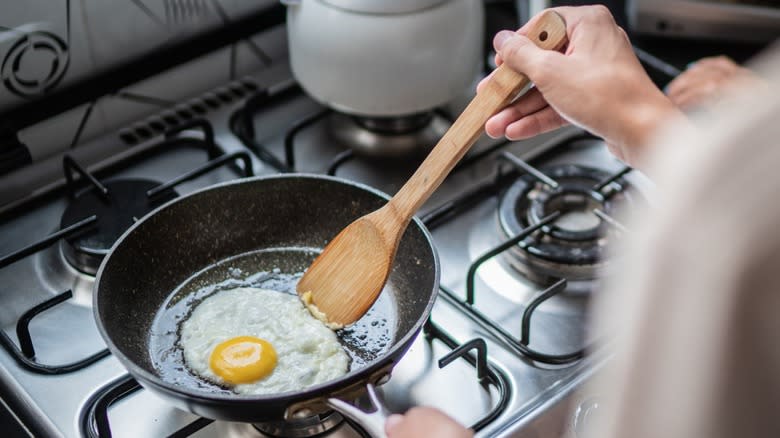
Frying an egg seems like such a simple task: Just crack your egg into the hot, greased pan, and wait for it to cook, right? Unfortunately, for something that seems so simple, there are actually a number of mistakes that you can easily make when frying eggs, from using eggs straight out of the fridge to using the wrong pan.
Whether you class yourself as a seasoned egg expert who's never failed to serve up the perfect fried egg or a bit of a novice when it comes to frying eggs, the key to improving your egg game is being aware of where things could all go wrong. With that in mind, we take a look at the mistakes you might be making when frying eggs.
Read more: 14 Liquids To Add To Scrambled Eggs (And What They Do)
Using Eggs Straight From The Fridge
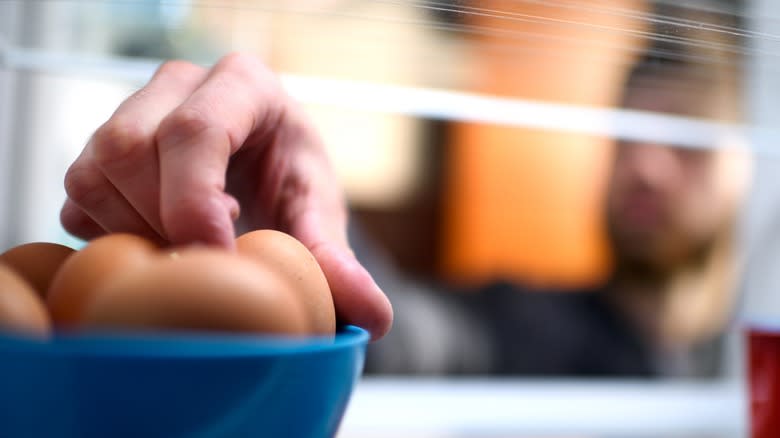
How often have you taken eggs straight out of the fridge and cracked them into a hot pan? If you're anything like most of us, it's happened at least a few times.
According to Food Network chef Robert Irvine, when frying eggs, you should always take them out of the fridge — assuming that's where you store them — and wait until they come to room temperature before cooking them. Fridge-cold eggs may steam while frying when they hit the hot pan.
Another reason to not use eggs straight from the fridge is that cold eggs could take longer to cook. This means you end up with the dreaded watery white and overcooked yolk combo that nobody wants from their eggs. What are you going to dunk your toast in?
Don't have time to wait for your eggs to come to room temperature? Even removing them from the fridge for a few minutes before cooking can help.
Using The Wrong Fat
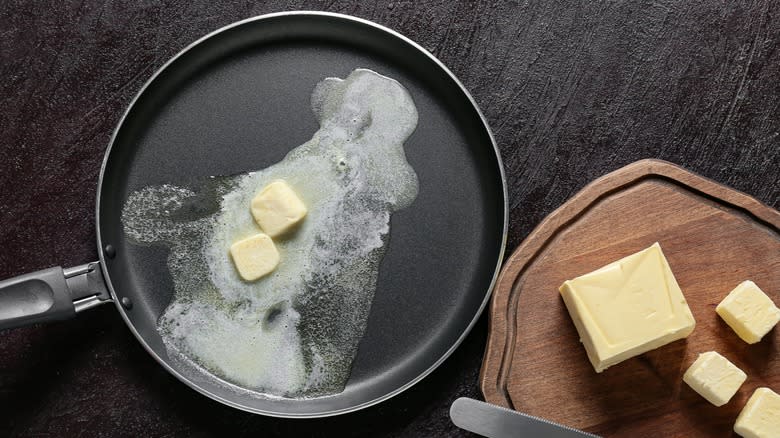
On the quest for the perfect fried eggs, don't use oil with a strong flavor, like sesame oil or garlic-infused oil — though chili oil drizzled over fried eggs is delish! Instead, stick to butter or olive oil. These are the most common fats to use for frying an egg, with butter imparting a rich flavor.
If you're cooking bacon at the same time as the eggs, you could also use bacon fat. Note, though, that this won't result in perfectly white whites as the fat from the bacon won't be as clear as using fresh fat for frying — so if this is a dealbreaker for you, cook your eggs in a separate pan.
With that said, if you're using fried eggs as part of another dish — like topping an Asian dish with a fried egg, for example, you could always use a flavored oil to cook your eggs. For best results, though, keep it simple with olive oil or butter.
Frying At The Wrong Temperature
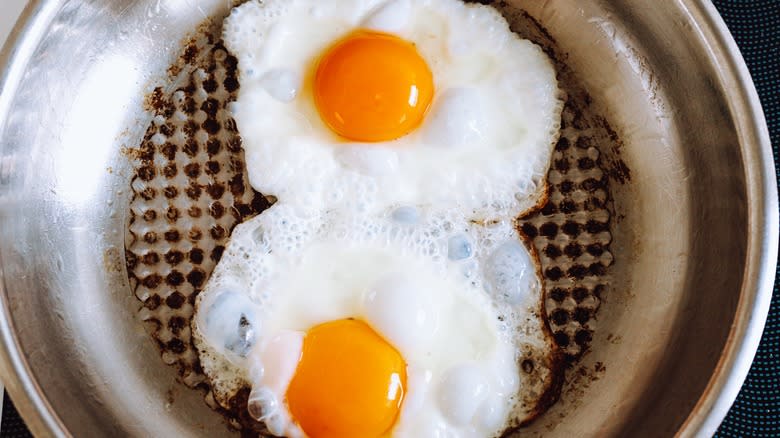
It's tempting to fry your eggs over high heat to ensure lovely crispy edges. Hold it right there! Adding your eggs to a really hot pan might mean you end up overcooking the yolk, or your whites might get too crispy.
Ultimately, it all depends on how you like your fried eggs. Some people love crispy whites, while others prefer a softer texture. A medium-low temperature will give you a soft, silky egg, though bear in mind using a lower temperature means your eggs will take a while longer to cook.
Frying over medium-high or high heat will result in very crispy whites. It will also mean the oil spits, which could be messy, and it's easy to overcook your yolk on a higher heat, too.
This isn't really a mistake, as such, as much as it is all about personal preference. Deciding how you like your fried eggs will help you determine the optimum temperature for the best results.
Not Using A Non-Stick Pan
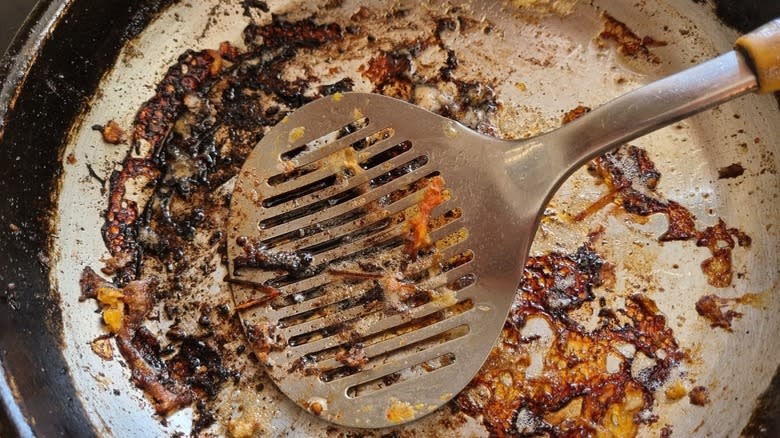
You can cook fried eggs in any type of frying pan, but using one with a non-stick coating is the best option. If you cook your eggs in a regular pan, without a non-stick coating, chances are your egg will stick.
Stuck eggs are hard to slide out onto your plate or toast for serving. There's also an increased chance that you'll break the yolk if your egg is stuck to the pan.
Using a non-stick pan with butter or olive oil to grease it will ensure the perfect egg. With a non-stick pan, your fried egg will slide out easily onto your toast or plate and look perfect. It'll be easier to clean up afterward too, as your pan will just need a wipe down with soapy water as opposed to a long soak to remove all the egg that has become stuck to the interior of the pan.
Not Using A Lid
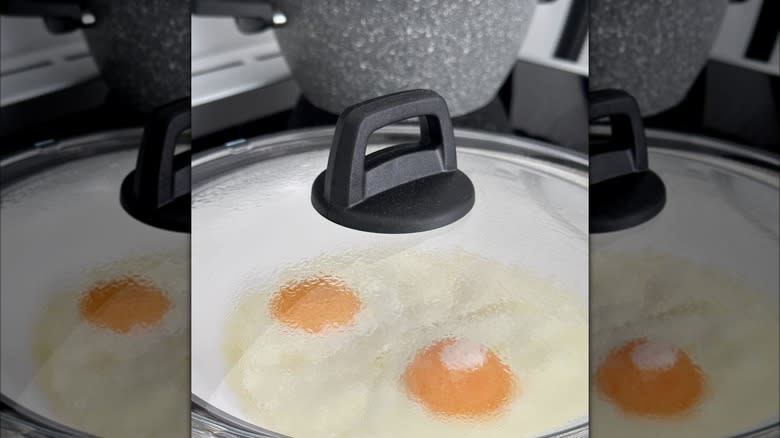
Though many fry eggs without using a lid, the debate is open as to whether you really should use one. Many professional chefs say a lid is essential to ensure that your eggs cook through evenly, without burning or blistering the whites or overcooking the yolks.
This is another "mistake" that really comes down to a matter of preference. If you prefer your eggs on the crispy side — and who are we to judge — then you might want to leave the lid off.
For foolproof, perfectly cooked fried eggs with smooth, soft whites and runny yolks, using a lid is a great idea. Just make sure the lid you choose fits your pan properly, so it doesn't end up ruining your eggs! A lid that's too small won't cover the pan properly and could also end up sliding into the pan and damaging your perfect fried eggs.
Frying For The Wrong Length Of Time
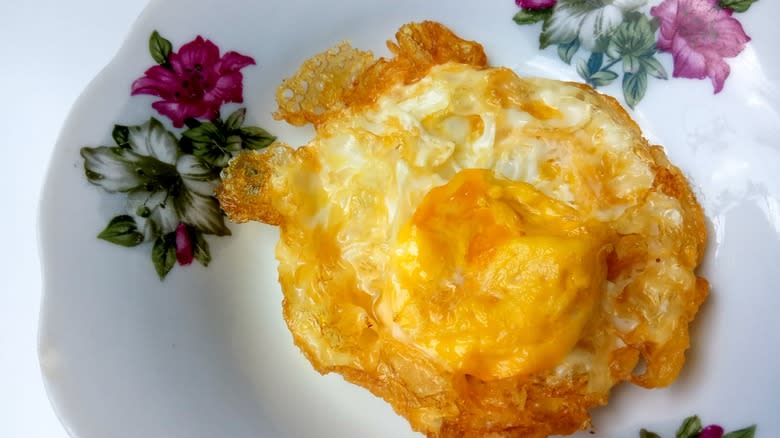
One of the most common mistakes you might be making when frying eggs is cooking your eggs for the wrong length of time. Bear in mind that once your egg appears perfectly cooked, it takes a few seconds to get it from the pan to your plate.
During that extra time spent in the pan, your egg continues cooking, even after you've turned off the heat. Many people don't factor in this extra time and end up with an overcooked egg with a solid yolk or burnt white.
The trick to ensuring you don't make this mistake? Cook your fried egg until it's almost perfect. Then, take it off the heat and get ready to serve it. Those few extra seconds it spends in the pan while you prepare your plate or toast will ensure that by the time you plate your egg, it is cooked to absolute perfection.
Not Using Enough Fat
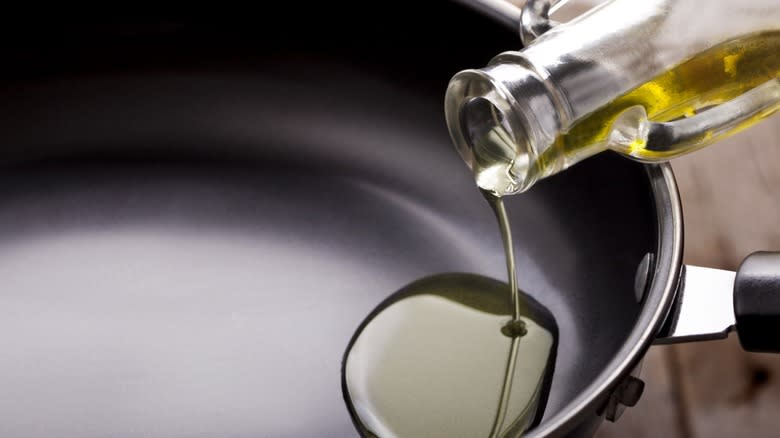
When you're frying eggs, it's tempting to try and reduce the amount of fat you're using to prevent spitting and mess from frying, but also in an attempt to make your fried eggs healthier. However, not using enough fat is a mistake many people make when frying eggs.
It's important to use enough fat to coat the pan and prevent the egg from sticking. Use too little fat and your egg might stick and burn, even in a non-stick pan. This could result in damage to the yolk, if you struggle to get the egg out of the pan, or a mess to clean up afterward, when there's a burnt-on egg stuck all over your pan.
If you're using butter or olive oil, make sure to add plenty to the pan — around three tablespoons of butter is about right for two eggs. You can baste your eggs with any extra fat, to ensure a perfectly cooked yolk.
Adding Eggs Before The Pan Is Hot Enough

Just as using fridge-cold eggs is a cardinal sin when it comes to frying eggs, so is using a pan that isn't hot enough. Your pan doesn't need to be smoking hot or spitting, but it does need to be at the correct temperature for frying eggs.
Adding eggs to a pan that's adequately hot will create a little steam, preventing the eggs from sticking. Not only will that make sliding your eggs out of the pan a breeze, but it will also mean less mess to clean up.
But how do you tell when your pan is hot enough? When oil is hot enough to add eggs, it will shimmer. For butter, you can tell it's hot when the foam vanishes.
We can't guarantee your eggs will always turn out perfectly by ensuring your pan is at the right temperature. However, on the quest for the ultimate fried egg, this step definitely helps.
Using Eggs That Aren't Fresh
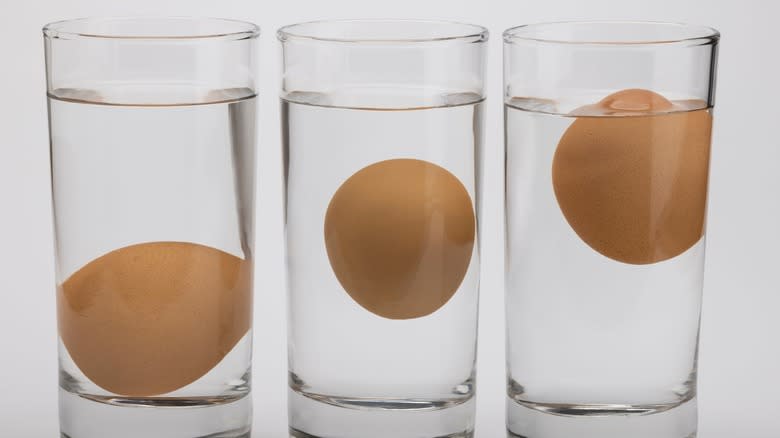
While it's generally okay to use eggs past their best-before date, using old eggs for frying isn't a great idea. Fresher eggs hold together better, as older eggs have thinner whites and yolks.
This means when you add an older egg to your pan, the white won't hold its shape as well, and the yolk won't sit perfectly and wobbly on top of the whites, ready to dunk a slice of toast (or a sausage) into.
You can't always tell when an egg is past its best, either. One sure way to check is by placing your egg into a bowl of water. If the egg sinks, it's fresh and can be used for frying. Eggs that float to the top of the water have an air pocket in their base. This means they're unsuitable for frying. In fact, it usually means they're bad and should be thrown away.
Being Heavy-Handed With Your Eggs
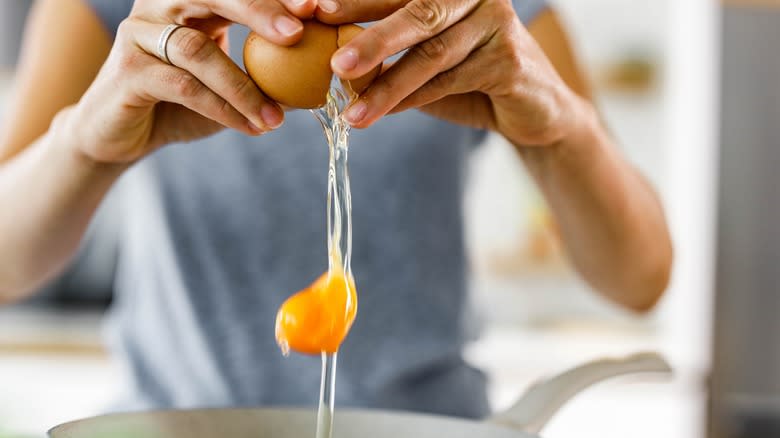
Don't forget that eggs are pretty delicate, so don't be heavy-handed when preparing fried eggs. You should never crack your eggs on the lip of the pan, as you might break the yolks. Instead, crack them into a bowl, ramekin, or other dish, then carefully slide them into the hot fat. Breaking your eggs into a bowl also gives you the opportunity to fish out any stray pieces of shell.
Dropping your eggs into your pan from a height is a no-no too. Hold your bowl or dish close to the pan and slide them in carefully, otherwise, you might end up with an egg that looks less than perfect.
It's important to take care when moving your egg around the pan or sliding it out onto your plate, too. You should use a spatula or similar implement, and go gently to ensure you don't break the yolk.
Not Greasing Your Egg Rings
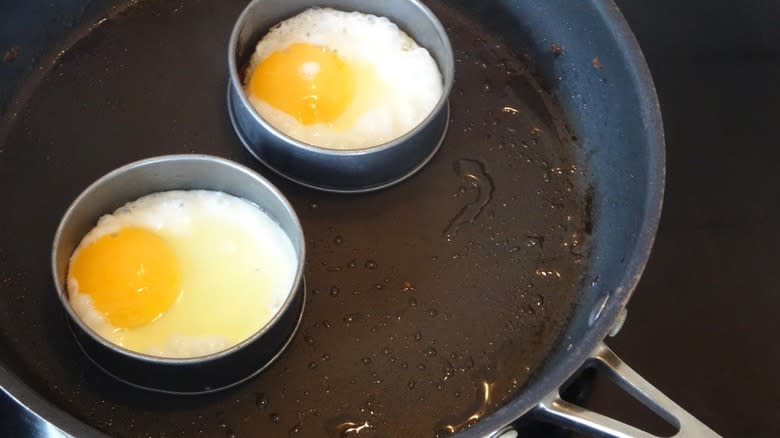
Egg rings or molds are a handy way to get perfectly shaped fried eggs, great if you're cooking for guests. You'll find both silicone and metal egg rings available, and there's a key difference between the two.
If you're using a metal egg ring, don't forget to grease it. Otherwise, you run the risk of your egg sticking to the mold and coming out less than perfect, which was the whole point of using the ring in the first place!
We've got some good news if you're using silicone egg rings. These don't normally need to be greased, saving you time. They're usually easier to clean, too, as eggs won't stick to them while frying.
Finally, and this may sound obvious, don't forget that your egg rings will be very hot after use! Always remove them from the pan using utensils and not your bare hands, or you could burn yourself.
Not Seasoning Your Eggs
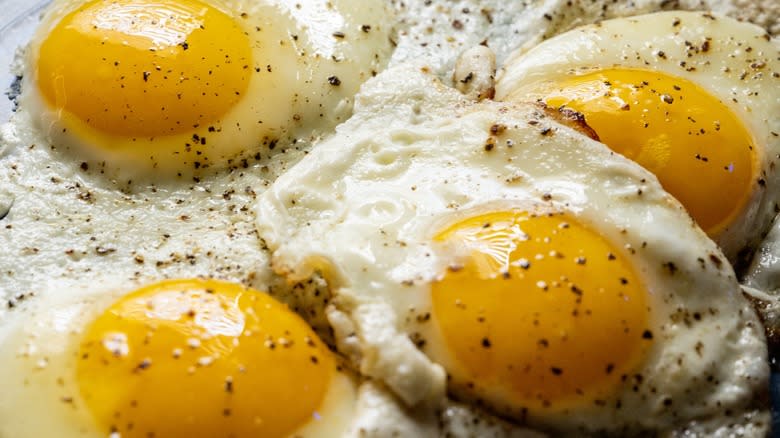
How many times have you fried an egg and forgotten to season it? Sure, you don't have to season your eggs while they're cooking, but adding some salt and pepper either while they're frying or just before serving is a great idea to ensure your eggs are absolutely, perfectly delicious.
Bored of salt and pepper? You could also try seasoning your eggs with a little paprika or smoked paprika. A drizzle of crispy chili oil turns a humble fried egg into something quite spectacular, though it's spicy stuff, so go easy!
You can also use some other great seasonings on your fried egg. Try a sprinkle of red pepper flakes, a dash of hot sauce, or some salsa, for added spice. Za'atar, a Middle Eastern spice blend, adds a wonderful woody, earthy tanginess to eggs, while cumin is also an excellent addition with its warm, earthy, citrus flavors.
Read the original article on Daily Meal.

